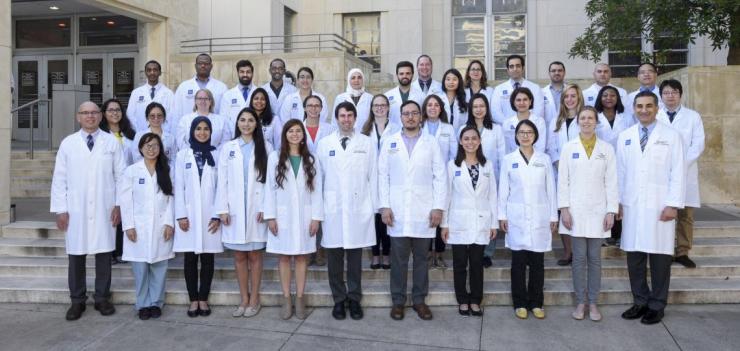Director and Chief Residents' Message

Thank you for your interest in the Department of Pathology & Immunology at Baylor College of Medicine. We invite you to watch the video, explore our website and read this statement to learn more about the program.
At least six PGY-1 level residents join our program each year and we currently offer 12 fellowship positions, 11 of which are ACGME accredited.
Our main goal is to provide residents the best possible training in a diverse and friendly environment. Our faculty members are approachable and have an “open-door” policy; residents are welcome to stop by and ask questions at any time. We also have a robust mentorship program where each resident is assigned both a faculty and a resident mentor at the start of residency. The role of the mentors is to guide and help residents during their training, including assistance with the fellowship selection and application processes and eventual job-application process. If you would like to learn more about where our residents go, please check our alumni page.
Another important feature of our program is our multicultural aspect. We have a diverse group of residents, which further enriches the program and creates a healthy “big family” type environment. Residents support each other and enjoy each other’s company inside and outside the hospital.
Several aspects of our training program result in an unparalleled experience. First, we receive clinical training in an absolutely unique combination of hospital settings: county (Ben Taub Hospital), pediatric (Texas Children's Hospital), Veterans Affairs health system (Michael E. DeBakey Veterans Affairs Medical Center), private practice (Baylor St. Luke's Medical Center), and community-based private practice (St. Joseph Medical Center). Residents may also elect to rotate at The University of Texas MD Anderson Cancer Center, and on subspecialty surgical pathology services at BCM (including genitourinary pathology and dermatopathology). In addition, our autopsy service and a rotation at the Harris County Institute of Forensic Sciences enable effective autopsy training and performance. As a result, residents and fellows receive unique exposure to a wide variety of service experiences in pathology.
Our morning conferences and departmental Grand Rounds are virtual. Plexiglass shields have been installed at the microscopes at multiple training sites including BCM and Texas Children’s Hospital. Additionally, some sign out sessions are virtual, and each resident is assigned a specific desk at each hospital to limit shared spaces.
Baylor also offers a myriad of opportunities to residents and fellows who are interested in a research career. Opportunities exist at the Dan L Duncan Comprehensive Cancer Center, the world-class Human Genome Sequencing Center, the Graduate School of Biomedical Sciences, Texas Children's Hospital, MD Anderson Cancer Center and on our numerous clinical services. This provides a variety of opportunities in translational, clinical, and basic science research.
Finally, residents have many opportunities to teach, both informally (medical students on elective rotations and junior residents) and formally (by lecturing to medical and physician assistant students). Graduated responsibility is delegated in order to help residents and fellows develop the competence, confidence, and independence to succeed as skilled pathologists in any practice setting.
We believe that our residents and fellows receive an incomparable variety of experiences and hope that you find our program as exciting as we do. Our contact information is listed below. Please feel free to contact us with questions about our training program. We look forward to hearing from you!
Sincerely,
Lois Dodson, M.D., Ph.D
Chief Resident
lois.dodson@bcm.edu
Georgia Huffman, M.D.
Chief Resident
georgia.huffman@bcm.edu
Rachel Guest, M.D.
Associate Chief Resident
rachel.guest@bcm.edu
Katelyn Moss, D.O
Associate Chief Resident
Katelyn.Moss@bcm.edu








